Key takeaways:
- Engineering technology bridges theory and practice, facilitating innovation through collaboration and understanding of new materials and tools.
- Adapting to new technologies requires a growth mindset, ongoing education, and proactive engagement to remain competitive in the engineering field.
- Common challenges include uncertainty, generational gaps, and the rapid pace of technological advancement, necessitating mentorship and continuous learning.
- Hands-on experimentation, online resources, and communal support are vital strategies for mastering new tools and maintaining a lifelong learning mindset.
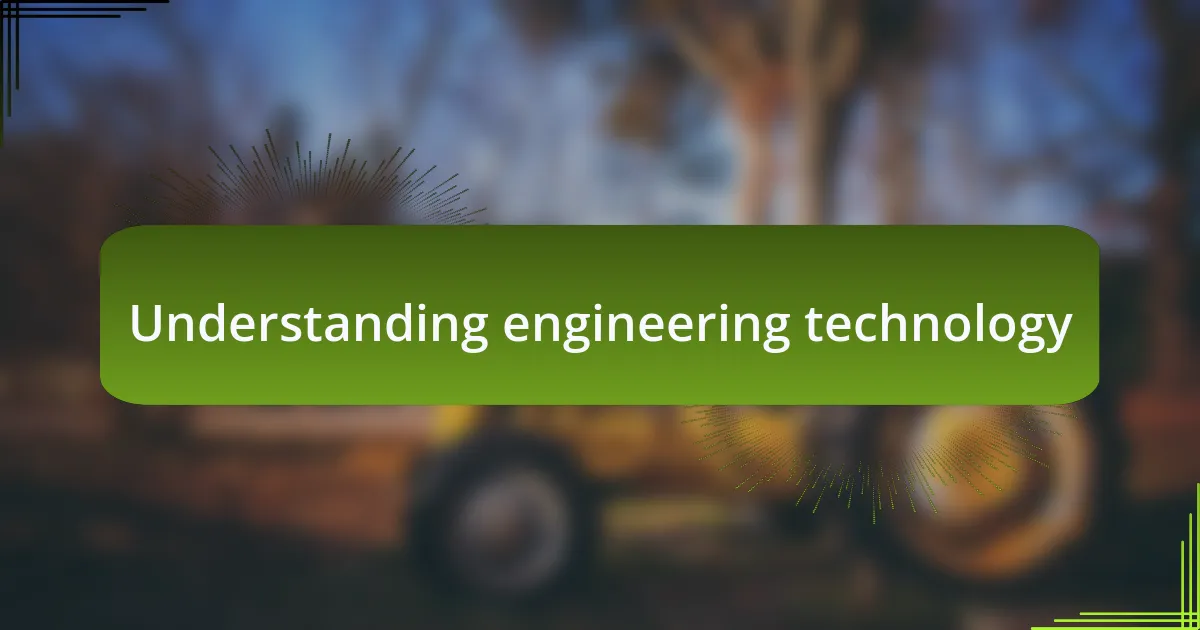
Understanding engineering technology
Engineering technology encompasses a wide array of tools, techniques, and methodologies aimed at solving complex problems. I often think about how it transforms abstract ideas into practical solutions. For instance, when I first started working with CAD (Computer-Aided Design) software, I was both excited and overwhelmed. It was fascinating to see how a simple sketch could evolve into a detailed blueprint, but I remember questioning how I could ever master it.
In my experience, the core of engineering technology lies in its ability to bridge theory and practice. I recall a project where my team had to integrate new materials into our designs. Initially, I felt hesitant. How could these materials withstand the same stresses as traditional ones? Through testing and collaboration, I learned that understanding the properties of new technologies not only boosts confidence but also opens doors to innovation.
What truly strikes me about engineering technology is its continuous evolution. Every day brings new advancements and tools that can either simplify or complicate our work. I often ponder: How can I keep up with this rapid pace? Embracing a mindset of lifelong learning has helped me adapt, and I believe it’s essential for anyone in the field. It’s not just about keeping up; it’s about exploring the possibilities that these new technologies can offer us.
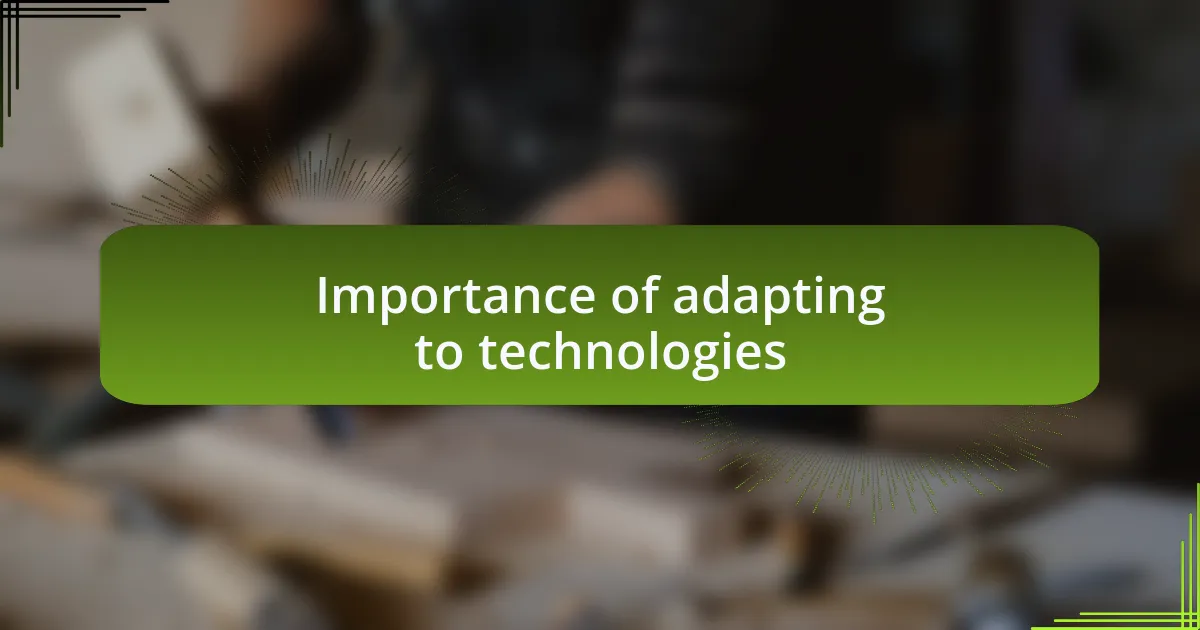
Importance of adapting to technologies
Adapting to new technologies is critical in engineering because it directly influences our ability to stay competitive in the field. I remember a time when our team was hesitant to implement automation into our processes. Initially, fear crept in – would we lose our touch? Yet, as I began to understand the efficiency and precision it brought, I realized that embracing change could unlock high-level creativity and innovation.
In my journey, I’ve found that adapting to technology is not just about learning new tools; it’s about fostering a growth mindset. For example, when faced with unfamiliar software, I took a step back and asked myself how this new tool could enhance our projects. This perspective shifted my anxiety into excitement, and I found that being open to learning turned obstacles into opportunities for development.
Moreover, the importance of adapting to technology can often be a matter of survival in the fast-paced engineering world. I recall witnessing a colleague who resisted adopting a new project management platform. Over time, they fell behind as the rest of us streamlined our workflows. I learned the hard way that hesitation can lead to missed opportunities. The lesson? Engaging with new technologies proactively not only strengthens your skill set but also keeps you vital in an ever-evolving landscape.
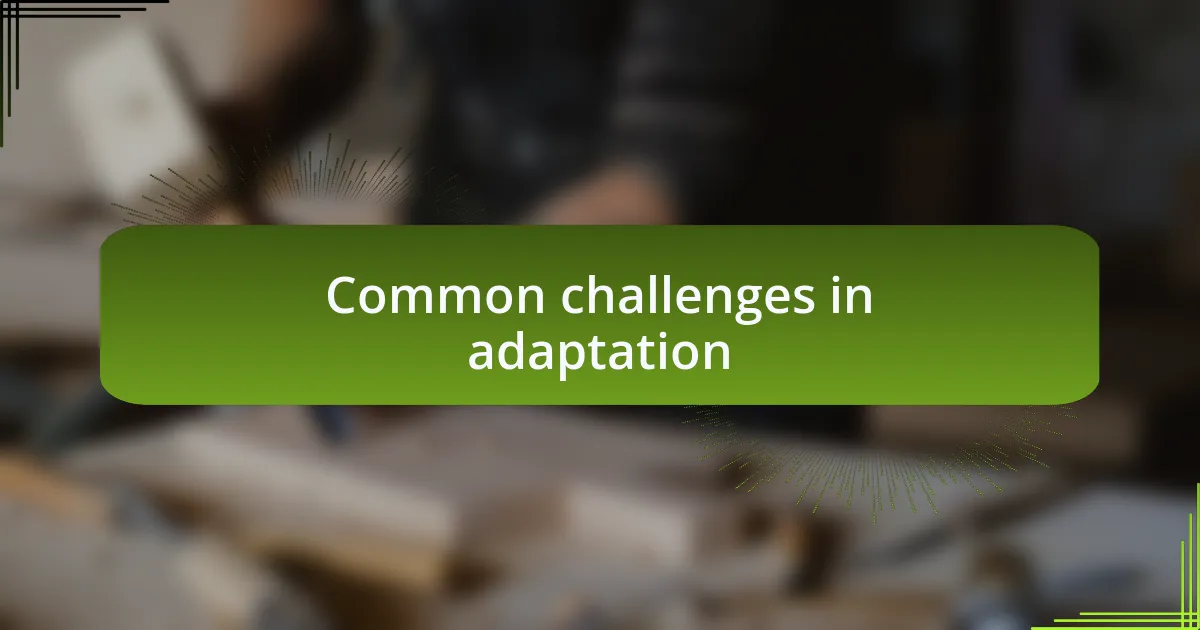
Common challenges in adaptation
Adapting to new technologies often brings a wave of uncertainty. I vividly remember when our team transitioned to a cloud-based system. Initially, there was a palpable tension as we faced concerns about data security and the learning curve associated with the shift. Those feelings of apprehension can be daunting, but they’re a common reaction when something new disrupts our familiar routines.
Another challenge I’ve encountered is the generational gap in technology adaptation. I once worked with a seasoned engineer who preferred traditional methods for his projects. His reluctance highlighted a broader issue—how can we bridge the divide between tech-savvy newcomers and those who might feel overwhelmed? It made me realize that facilitating mentorship and open dialogue is critical. By encouraging collaboration, we can create an environment where everyone feels supported, regardless of their comfort level with technology.
Lastly, the speed of technological change can be overwhelming. I still recall attending a conference where the rapid advancements in AI tools left many of us feeling lost rather than inspired. I questioned how to keep pace and contribute meaningfully amidst so much innovation. It taught me that continuous education is essential. Just like any engineer must hone their skills, staying updated with technology trends is vital for thriving in our careers. How do I deal with that? I make learning a routine part of my life, frequently exploring online courses and webinars to stay ahead of the curve.
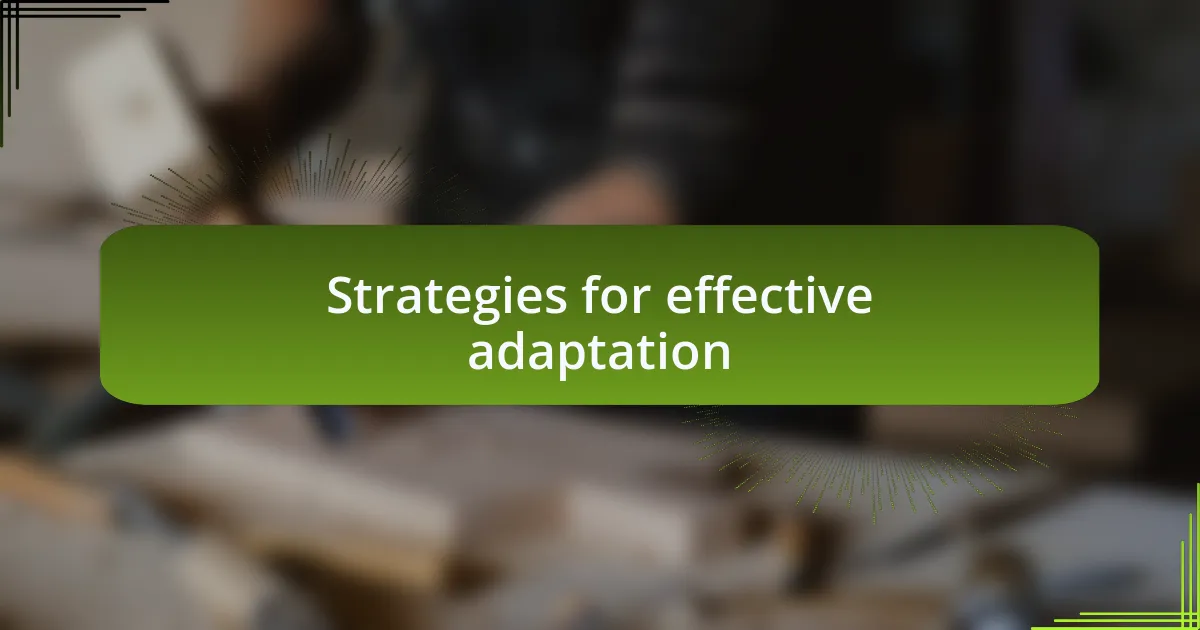
Strategies for effective adaptation
Embracing change requires a proactive approach, and I’ve found that setting clear goals is essential. During my last technology upgrade, I created a personal roadmap outlining what I wanted to achieve with the new software. This not only clarified my focus but also made the process feel less daunting—almost like a treasure map guiding me through uncharted territory. How do I ensure I’m not overwhelmed? I break down tasks into manageable steps and celebrate small victories along the way, which keeps me motivated.
Collaboration can be one of the most effective strategies for adapting to new technologies. In my experience, working closely with colleagues who are more adept at using certain tools has transformed my learning process. I remember a project where a teammate took the time to walk me through a new modeling system. Her patience not only boosted my confidence but also fostered a sense of camaraderie that made the learning experience enjoyable. Isn’t it fascinating how sharing knowledge can build stronger teams?
Finally, I’ve realized that maintaining an open mindset is crucial. When I first encountered a new project management tool, I was skeptical—did we really need another app? However, committing to explore its features led to a surprising discovery: it streamlined our workflow significantly. This experience taught me to embrace curiosity, asking myself, “What if?” rather than succumbing to resistance. By staying open to possibilities, I’ve been able to turn challenges into opportunities for growth and innovation.
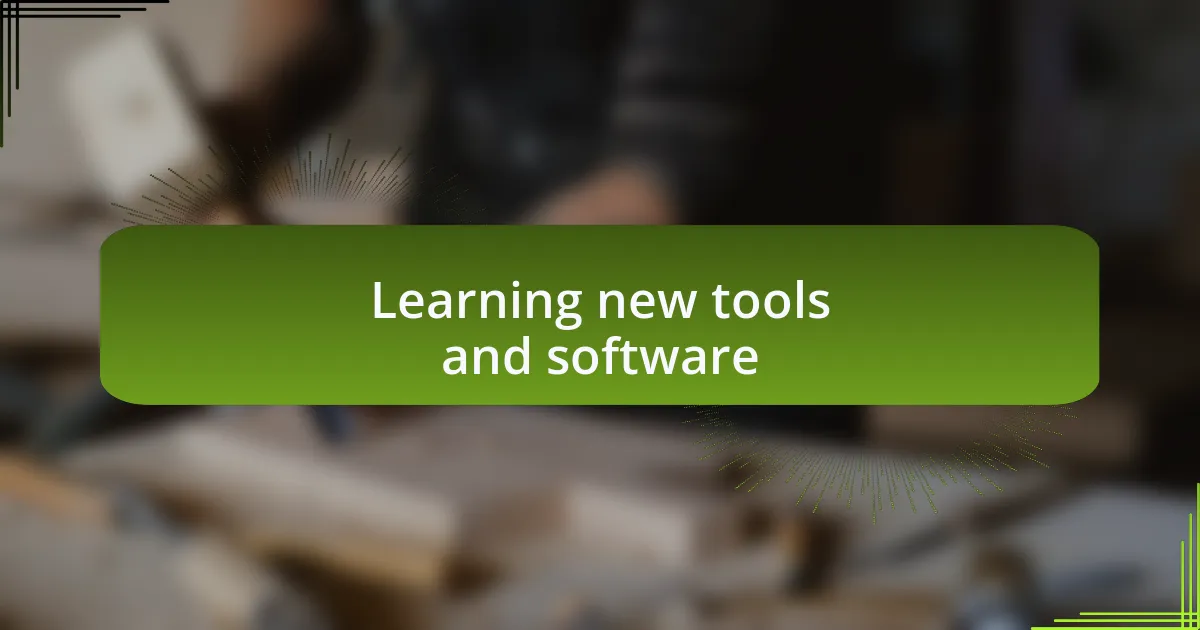
Learning new tools and software
Learning new tools and software can often feel overwhelming, but I’ve discovered that hands-on experimentation is one of the best approaches. I vividly remember grappling with a complex engineering design software that seemed intimidating at first. Instead of simply reading the manual, I dove in headfirst, creating mock projects to familiarize myself with the features. That trial-and-error process made a significant difference; it turned a steep learning curve into an engaging challenge. Have you ever felt the thrill of figuring something out on your own?
In my journey, I’ve also found that online tutorials can be a treasure trove of insights. When I was learning a new simulation tool, I turned to video tutorials from industry experts. Watching their techniques and thought processes allowed me to see the software through different lenses. It was enlightening! I often ask myself, “How can I apply these techniques in my own projects?” and immediately try to implement them. This not only enhanced my understanding but also sparked creativity.
Finally, feedback plays a critical role in mastering new software. I remember presenting my first project using a new design tool to my peers. Their constructive criticism helped me pinpoint areas for improvement that I hadn’t noticed before. It was initially nerve-wracking, but it turned into a gratifying experience. Understanding that feedback is just a stepping stone toward proficiency has reshaped my learning perspective. What strategies do you use to seek out feedback, and how do they impact your journey with new technologies?
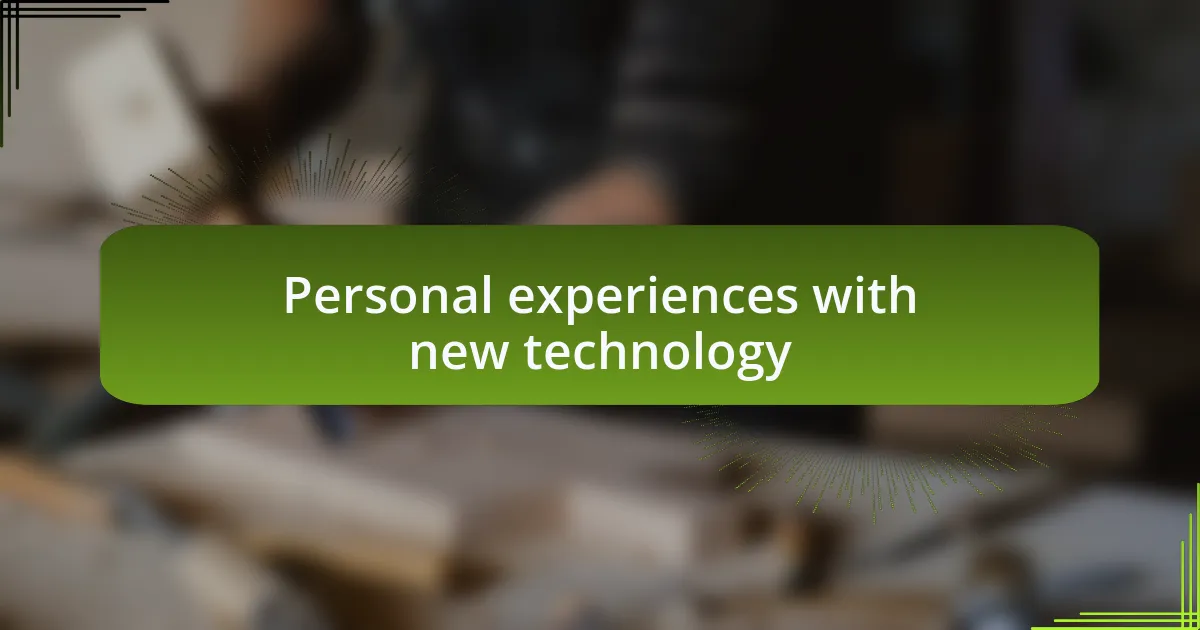
Personal experiences with new technology
Adapting to new technology often feels like stepping into uncharted territory. I recall the first time I had to interact with a 3D printing software. The interface seemed foreign and overwhelming. I decided to approach it like a puzzle, taking it one piece at a time. After a few frustrating attempts and moments of excitement when things worked, I found myself not only using the software effectively but also exploring its capabilities. Have you ever had that moment when everything clicks into place?
The emotional journey of learning new technologies has its ups and downs. I remember the excitement of discovering a data analysis tool that could streamline my workflow. While the initial learning process was taxing, there was a sense of empowerment that emerged with each small victory. I often reflect on how a learning experience can shift from frustration to triumph with perseverance. How do you handle those emotional rollercoasters when embracing new tech?
In my experience, collaboration has been a game-changer when adapting to new tools. During a group project where we implemented a new engineering simulation program, I was amazed at how sharing knowledge and skills led to collective success. The discussions we had, fueled by our varying levels of familiarity with the software, turned challenges into solutions. Isn’t it fascinating how collaboration can amplify our learning experience?
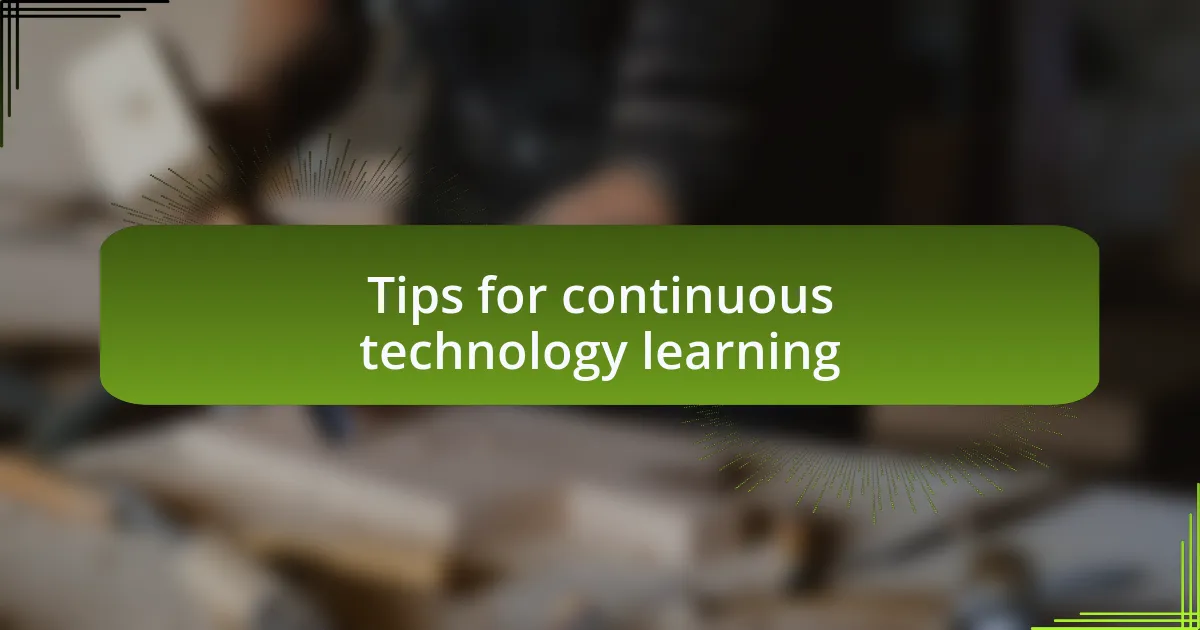
Tips for continuous technology learning
Every time I dive into a new technology, I make a commitment to learn something each day. For example, when I tackled a complex coding language, I set aside just 15 minutes daily to watch tutorials or practice small projects. This simple habit not only kept me engaged but slowly built my confidence, allowing me to see progress without feeling overwhelmed. How often do you dedicate time for such incremental learning?
I also find that documenting my learning process can be incredibly beneficial. Keeping a journal or a digital log of discoveries and challenges helps me reflect on my journey. I remember jotting down my thoughts as I learned about machine learning concepts, and being able to look back on my previous “aha” moments fueled my motivation. Have you ever tried documenting your learning experiences?
Another strategy I’ve embraced is connecting with online communities. Joining forums or social media groups relevant to the technology I’m learning has provided me with diverse perspectives and support. I once posted a question about a persistent issue in a coding forum, and the responses were not only insightful but often led to breakthroughs I hadn’t considered before. Isn’t it reassuring to know that there’s a whole community out there willing to share their knowledge?